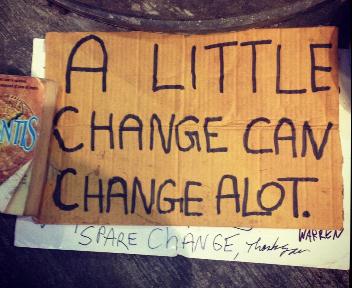
Evergreen housing worker Victoria Clarke says cutting the provincial benefit will be 'catastrophic' for all street youth.
Drastic budget cuts in Ontario will make life more dangerous for homeless queer youth this winter, experts say.
The province’s Community Start Up and Maintenance Benefit will end in January 2013. The $114 million benefit supports 200,000 individuals a year, including youth living in unhealthy or abusive home environments. Ontario will give $62.6 million to municipalities so they can address emergency housing at a local level – but this is only half of what the province currently allocates for the benefit.
The cut coincides with an exploding need for housing assistance in Toronto. Evergreen Yonge Street Mission, a Toronto charity, helped 811 people find housing in 2011, up from 213 people in 2010. Fourteen youth shelters in the city have a total capacity of 525 beds. But a report from Covenant House, a downtown youth shelter, estimates that 1,500 to 2,000 youth are homeless on any given night in Toronto.
I Alex Abramovich, one of the only Canadians studying queer youth homelessness, says “cutting this benefit is a very very bad idea.” Approximately 25 to 40 percent of homeless youth are lesbian, gay, bisexual or trans, and “it is a crisis that is definitely on the rise,” Abramovich says. This estimate doesn’t include the “hidden homeless” who avoid shelters or queer youth who are afraid to come out due to violence in the system. An American study from 2011 estimates that as many as one in four lesbian or gay teens are homeless.
A number of day programs provide food, healthcare and support for Toronto’s homeless queer youth, but Abramovich says they still need a specialized shelter. “LGBT youth avoid the shelter system because it is an extremely dangerous place for them . . . This benefit is helping them maintain some sort of housing or helping them stay away from a system which they have said is dangerous. Cutting this benefit is going to make it even more dangerous for them.”
Teal-Rose Jaques, 23, is a trans woman who left home when she was 18 years old. Jaques was in the shelter system for five years and says that staff at one shelter wouldn’t recognize her chosen name, making it difficult to receive phone calls. They also didn’t let her go to the dining room wearing feminine clothing.
Beyond feeling unwelcome, Jaques didn’t always feel safe. She found that an X had been cut with a knife on the Positive Space sticker on her bedroom door. She was called a “fag” and was verbally threatened by another resident. Staff did not respond to either incident, she says.
Jaques is much happier living in her own apartment. “There is no way that I would have been able to get the apartment that I’m in now without Start Up,” she says.
She also used benefit money to buy a computer so she could attend school. This summer, she graduated from George Brown College.
Evergreen housing worker Victoria Clarke says that cutting the benefit will be “catastrophic” for all street youth. Clarke wants the community to participate in the fight against homelessness. Even as little as $3 for transportation will help; Clarke sees between 12 and 17 clients a day but has only 10 transit tokens to hand out. This means half her clients have no way to get to meetings with potential landlords.
Beyond financial support, Clarke thinks street youth need more compassion because many are victims of severe abuse and simply have nowhere else to go.
The Spectrum Youth Needs Committee launched an initiative to build a shelter for homeless queer youth in 2010, but the project has been on hiatus for a year. Michael Erickson, a former NDP candidate for Etobicoke-Lakeshore who led the initiative, says he hopes to revisit it in the new year.
Meanwhile, this summer, Councillor Giorgio Mammoliti, who leads Toronto’s Homelessness Task Force, announced plans to shut down the shelter system and force homeless people off the streets and into transitional housing. “When it comes to talks about opening up a specialized shelter, I think people are really reluctant to be open to these ideas – because of these plans,” Abramovich says.
Councillor Kristyn Wong-Tam (Ward 27) says the cuts are “very problematic” and a “grave concern.” But she says the city will champion specialized transitional housing over a specialized shelter.
Wong-Tam says transitional housing is more economical and has a more lasting effect on the community. She is “very, very supportive” of working with the community to provide specialized transitional housing once the real estate and operating funds have been secured.
But this winter, queer youth will be out in the cold.

 Why you can trust Xtra
Why you can trust Xtra


